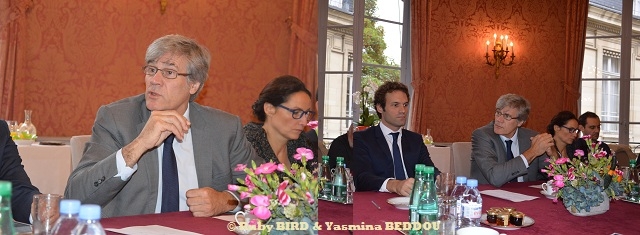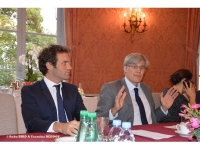Vips
COP 22 - Briefing by STEPHANE LE FOLL French Minister of Agriculture
Ministry of Agriculture October 21, 2016

Stéphane Le Foll, French Minister of Agriculture (Source: © Ruby BIRD & Yasmina BEDDOU)
USPA NEWS -
On October 21, 2016 was held an informal Briefing with some journalists to explain and pursue the French Plan toward MARRAKECH (Morocco) for the COP 22 on 7-18 November 2016. It will be the 22nd session of the Conference of the Parties. One of the crucial issues debated was the Launch of the...
On October 21, 2016 was held an informal Briefing with some journalists to explain and pursue the French Plan toward MARRAKECH (Morocco) for the COP 22 on 7-18 November 2016. It will be the 22nd session of the Conference of the Parties. One of the crucial issues debated was the Launch of the 4 per 1000 initiative by France on Tuesday 1st December 2015 during COP 21. Stéphane Le Foll, French Minister for Agriculture, AgriFood and Forestry; the Australian, German, New Zealand and Uruguayan Ministers for Agriculture; Graziano da Silva, General Secretary of the FAO and M. Mayaki, General Secretary of NEPAD were in attendance.
The 4 per 1000 initiative aims to generate growth in the rate of soil carbon in the form of organic matter of 0.4% per year in the coming decades. This rate of growth would make it possible to compensate for anthropogenic emissions of greenhouse gases. It would concern agricultural soils (growth objective of 1.4 Gt of carbon per year), forests (1.3 Gt per year) and soils affected by salinization or desertification (0.5 to 1.4 Gt per year).
Growth in the organic matter of soils would make it possible to improve the resilience of agriculture and its adaptation to climate change (less sensitivity to erosion, improvement of water retention capacity, etc.), agricultural yield and, in fine, food safety.
Growth in the organic matter of soils would make it possible to improve the resilience of agriculture and its adaptation to climate change (less sensitivity to erosion, improvement of water retention capacity, etc.), agricultural yield and, in fine, food safety.
Approximately thirty countries signed the initiative, including the majority of European Union countries, Australia, China, Costa Rica, Ethiopa, Indonesia, Mexico, Niger, New Zealand, Turkey and Uruguay. As did ECOWAS, various research centres (including INRA, IRD and CIRAD) and various non-governmental organisations, foundations and agricultural organisations.
The initiative includes two components: research on the one hand, and an action plan on the other. Stéphane Le Foll stressed that the latter has yet to be defined, as are sources of funding and governance of the initiative. These issues will be worked on for COP 22.
The initiative includes two components: research on the one hand, and an action plan on the other. Stéphane Le Foll stressed that the latter has yet to be defined, as are sources of funding and governance of the initiative. These issues will be worked on for COP 22.
During the COP 21, The Prince of Wales and the Peruvian Environment Minister, Manuel Pulgar-Vidal opened the 'Focus Event on Forest' to highlight three crucial conditions for successfully reducing deforestation :
* national programmes to restore forests, linked to international cooperation;
* dialogue with indigenous and local communities;
* the need to transform company supply chains.
The partners decided to reinforce their actions on appropriate soil management, recognizing the importance of soil health for the transition towards productive, highly resilient agriculture.
* national programmes to restore forests, linked to international cooperation;
* dialogue with indigenous and local communities;
* the need to transform company supply chains.
The partners decided to reinforce their actions on appropriate soil management, recognizing the importance of soil health for the transition towards productive, highly resilient agriculture.
Other initiatives were then presented :
* Adaptation for Smallholder Agriculture Programme (ASAP)
* 15 West-African Countries Transitioning to Agro-ecology
* The Blue Growth Initiative (BGI)
* The SAVE FOOD Initiative ““ (the Global Initiative on Food Loss and Waste Reduction)
* The Consumer Goods Forum
COP22 will take over the reins from COP21, it will focus on action items in order to achieve the priorities of The Paris Agreement, especially related to adaptation, transparency, technology transfer, mitigation, capacity building and loss and damages. Signatories to The Paris Agreement now have to develop their National Adaptation Plans.
* Adaptation for Smallholder Agriculture Programme (ASAP)
* 15 West-African Countries Transitioning to Agro-ecology
* The Blue Growth Initiative (BGI)
* The SAVE FOOD Initiative ““ (the Global Initiative on Food Loss and Waste Reduction)
* The Consumer Goods Forum
COP22 will take over the reins from COP21, it will focus on action items in order to achieve the priorities of The Paris Agreement, especially related to adaptation, transparency, technology transfer, mitigation, capacity building and loss and damages. Signatories to The Paris Agreement now have to develop their National Adaptation Plans.
The natural mechanisms that sustain the earth´s climate, and thus all living species, are in disorder. The Intergovernmental Panel on Climate Change (IPCC) was created in 1988 by the World Meteorological Organization (WMO) and the United Nations Environment Programme (UNEP). The IPCC is recognized as a body of scientific support to the Secretariat of the Convention. Since 1990 the group has produced an Assessment Report every 5 years.
The COP stands for the 'Conference of the Parties.' It is the supreme decision-making body of the United Nations Framework Convention on Climate Change (UNFCCC), opened for signature in 1992 during the Earth Summit in Rio de Janeiro and later entered into force in 1994. The COP was created and put in place in order to structure the efforts of the Parties to the Convention as they address climate change.
During the Press Briefing, Stéphane Le FOLL, Minister of Agriculture, AgriFood and Forestry mentioned the creation of a special Event involving young students from the agricultural education and where thoses ones would be offering an evening of theatrical improvisation.
During the Press Briefing, Stéphane Le FOLL, Minister of Agriculture, AgriFood and Forestry mentioned the creation of a special Event involving young students from the agricultural education and where thoses ones would be offering an evening of theatrical improvisation.
They will be performing in two teams and will be judged by a master of ceremony on crucial isues linked to the Earth preservation. It will be held at 'Théâtre La Bruyère' on November 14, 2016 at 8.00 pm.
Source : Ministry of Agriculture, Agrifood and Forestry - COP 21 - COP 22
Ruby BIRD
http://www.portfolio.uspa24.com/
Yasmina BEDDOU
http://www.yasmina-beddou.uspa24.com/
Source : Ministry of Agriculture, Agrifood and Forestry - COP 21 - COP 22
Ruby BIRD
http://www.portfolio.uspa24.com/
Yasmina BEDDOU
http://www.yasmina-beddou.uspa24.com/
Marrakech Cop 22 Cop 21 & Forestry Agrifood Ministry Of Agriculture Stephane Le Foll Yasmina Beddou Ruby Bird
Liability for this article lies with the author, who also holds the copyright. Editorial content from USPA may be quoted on other websites as long as the quote comprises no more than 5% of the entire text, is marked as such and the source is named (via hyperlink).






